Do I need a permit to build a deck in my backyard? Generally, yes. Building a deck often requires a permit to ensure it meets local safety standards and regulations. This requirement can vary based on the deck’s size, height, and attachment to the home.
Adding a deck to your backyard is not just about extending your living space; it’s an investment that enhances both the aesthetic appeal and the market value of your home. In areas like Massachusetts, where outdoor living is highly valued during warmer months, a well-designed deck serves as a luxurious transition between indoor comfort and the beauty of the outdoors.
A deck provides a perfect setting for quiet morning coffees or lively weekend gatherings, making it a versatile addition to any high-end home. The International Building Code (IBC) plays a crucial role in regulating deck additions, ensuring they meet minimum code requirements for safety and durability.
Permits ensure your deck is built to last and safe for everyone to enjoy. They are not merely bureaucratic hurdles but safeguards that ensure your deck adds value—both in terms of lifestyle and property price—without compromising on safety or legality. Most cities have Building Inspections Departments located within the City Hall building, which is a good place to start for applying for a permit.
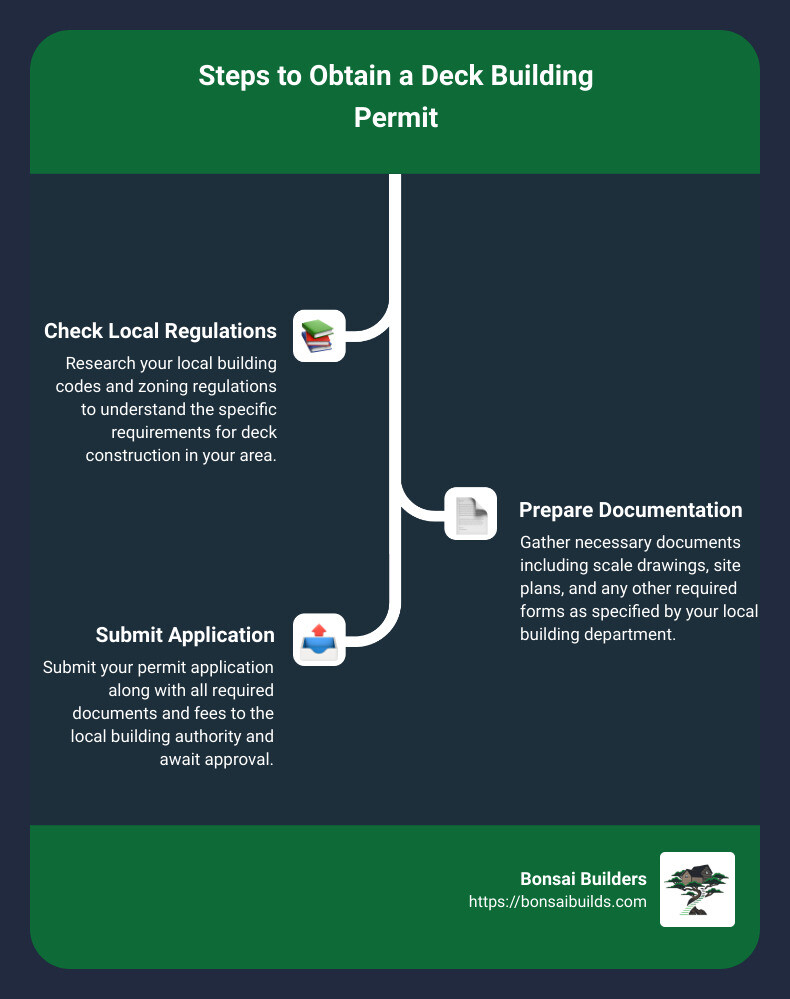
Table of Contents
Understanding Permit Requirements for Building a Deck
When planning to enhance your home with a deck, understanding the permit requirements is crucial for a smooth and legal construction process. There are different building permits you might need, each with its own range of costs, but rest assured, these permits typically won’t significantly impact your budget for the final deck building cost. A contractor can handle the entire permit process, including taking care of the paperwork and ensuring compliance with building codes and regulations.
Let’s dive into the details of when and why you might need a permit, and when you might not.
Do I Need a Permit to Build a Deck in My Backyard?
Local regulations, safety standards, and zoning codes play significant roles in determining whether you need a permit to build a deck. Generally, if your deck is attached to your home, exceeds certain size and height thresholds, or includes electrical or plumbing work, you will need a permit. Deck builders play a crucial role in ensuring that the structure is safe and complies with local building codes, which vary widely depending on where you live.
- Deck size: Typically, decks larger than 200 square feet require a permit.
- Attached to home: Decks that are attached to a structure usually need a permit.
- Height from ground: Decks more than 30 inches above the ground often require permits due to increased risk of injury from falls.
An elevation drawing, which provides a front or side view of the deck, is often required for permit approval.
When is a Permit Not Required?
There are exceptions to the rule, which can save you time and money if your project qualifies:
- Floating decks: These are not attached to any structure and generally do not require permits if they meet specific size and height restrictions.
- Low-height decks: Decks that are less than 30 inches above the ground and are not part of the main exit route from the home typically do not need a permit.
- Small area decks: If the total area is less than 200 square feet, you might not need a permit, but this can vary by local regulations.
How to Determine if Your Deck Needs a Permit
To avoid potential fines or required dismantling of your deck, it’s important to know exactly when a permit is necessary. Here’s what to consider:
- Deck features: Includes elements like railings, stairs, or multi-levels which often require a permit.
- Attached structures: Any deck that supports a structure or is attached to one typically needs a permit.
- Exit doors: If the deck serves as the main exit or entrance to your home, it will likely require a permit.
Always check with your local building authority to confirm specific requirements for your area. They can provide detailed information about the necessary permits and help guide you through the application process. This step is not just a formality—it’s a crucial part of ensuring that your deck is safe and adds value to your home without legal complications in the future.
Planning Your Deck with Compliance in Mind
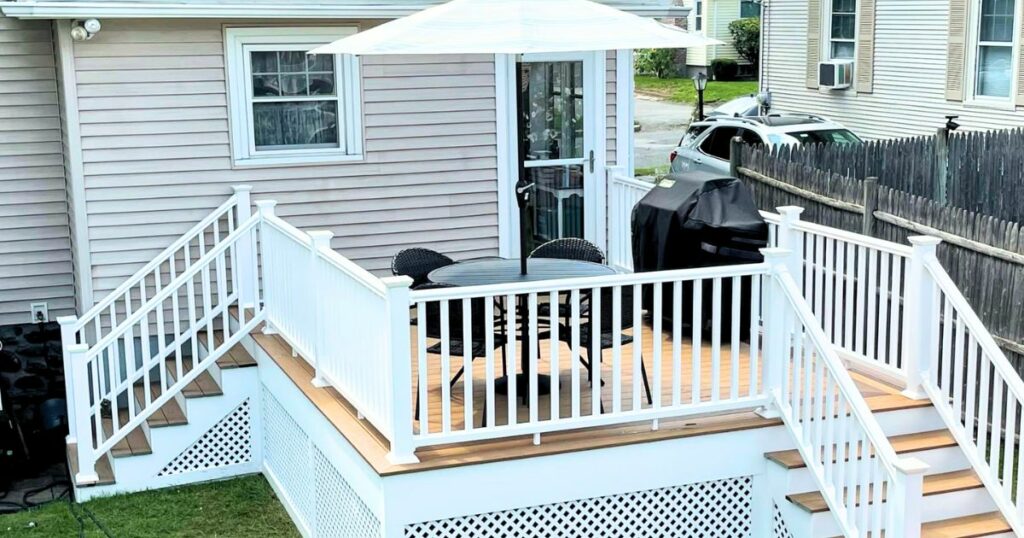
When you’re planning to enhance your home with a deck, compliance with local building codes isn’t just a formality—it ensures safety, legality, and can even affect your home’s resale value.
It’s crucial to know and maintain certain distances from each property line, which may require professional property survey documents or hiring a surveyor. A well-designed deck enhances your outdoor living space, making it more functional and enjoyable.
Here’s what you need to consider to make sure your deck meets all the necessary regulations and standards.
Types of Construction Plans You’ll Need
To get a permit for your deck, you’ll need to prepare detailed construction plans. These are critical because they show your local building department that your deck design adheres to all safety and zoning codes.
Scale Drawings: These are overhead views of your deck, showing the layout and dimensions. It’s important that these drawings are to scale to accurately represent the size and area of the deck.
Elevation Plans: These provide a side or front view of the deck, illustrating height and how the deck integrates with your home. Including an elevation drawing is crucial for understanding the overall structure and design, and it is essential for review by the building department to evaluate the vertical aspects of the project.
Site Plans: This map of your property shows where the deck will be located in relation to property boundaries and other structures. It’s essential for ensuring that your deck doesn’t encroach on easements or violate local zoning laws.
Creating these plans might sound daunting, but you don’t have to do it alone. Hiring professionals can help streamline this process.
Hiring Professionals for Deck Construction
Building a deck that is safe, durable, and compliant with local codes often requires more expertise than the average DIY project. Here’s who you might need:
Contractors: A licensed contractor can oversee the entire project from design to completion, ensuring that all work is up to code. They handle everything from obtaining the necessary permits to the actual construction and final inspections.
Deck Builders: Deck builders play a crucial role in ensuring that your deck is built to code and meets all safety standards. They are knowledgeable about the types of decks, such as attached and unattached, and the specific permits required for each. They also understand the differences between freestanding decks and floating decks, ensuring that construction details are meticulously followed.
Permit Expediters: These professionals specialize in navigating the permitting process. They can be invaluable in areas with complex regulatory environments, helping to avoid delays by ensuring that your paperwork is filed correctly and efficiently.
Structural Engineers: For decks that are elevated or attached to your home, hiring a structural engineer can be crucial. They ensure the design is structurally sound, which is not only a safety issue but a legal requirement as well.
By involving these professionals, you can ensure that your deck is not only beautifully designed but also safe and compliant with all local building standards and regulations. This not only protects you against potential legal issues but also enhances the longevity and value of your deck investment.
Always remember, the upfront cost of hiring professionals and obtaining permits is far less than the potential fines and costs of retrofitting a deck to meet codes after it has been built. Make sure to integrate these considerations early in your planning process to save time, money, and headaches later on.
Building a Deck with Bonsai Builders
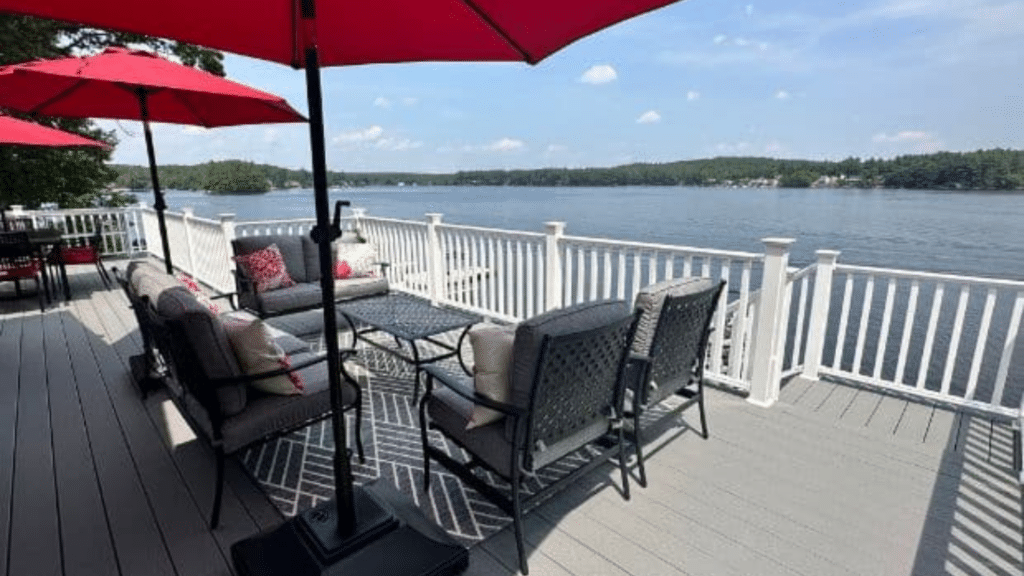
Master Craftsmanship
At Bonsai Builders, the focus is on delivering top-quality construction that lasts. Every deck is built with precision and care, ensuring that each screw and plank is perfectly placed. The team at Bonsai Builders has over 26 years of experience, with more than 125 successful projects under their belt, showcasing their commitment to excellence and durability in every project. Deck builders at Bonsai Builders ensure that the deck is built to code and meets all safety standards.
Exquisite Designs
Choosing Bonsai Builders means access to a range of stunning and innovative deck designs. Whether you’re looking for a multi-level deck, integrated seating, or unique railing designs, Bonsai Builders can turn your vision into reality. Their design process includes detailed consultations to ensure that every aspect of the deck is tailored to your preferences and the architectural style of your home. Bonsai Builders can handle the entire permit process, including paperwork and compliance with building codes.
Impeccable Taste
Bonsai Builders is not just about functionality; aesthetics play a crucial role in every project. The materials used are not only durable but also beautiful, offering a variety of textures and colors to match any home exterior. From classic wood finishes to modern composite materials, Bonsai Builders ensures that your deck looks elegant and remains low maintenance.
By choosing Bonsai Builders for your deck construction, you’re not just building a deck; you’re making a statement of style and quality that enhances the overall appeal and value of your property. With Bonsai Builders, your deck will be more than just an outdoor space; it will be a highlight of your home.
Conclusion
Building a deck is not just an enhancement to your home; it’s a wise investment that increases your property’s value and enhances your quality of life. By ensuring compliance with local building codes and the International Building Code (IBC) regulating deck additions, and obtaining the necessary permits, you safeguard this investment and avoid potential legal and financial complications.
Importance of Compliance: Ensuring that your deck construction complies with local regulations is crucial. It’s not merely a bureaucratic step; it’s about ensuring safety, sustainability, and securing the long-term value of your investment. Permits confirm that your deck is structurally sound and built according to safety standards, which is vital for your peace of mind and the security of those who enjoy this outdoor space. Most cities have Building Inspections Departments located within the City Hall building, which is a good place to start for applying for a permit.
Investment Value: A well-constructed deck offers more than just aesthetic appeal; it extends your living space, enhances outdoor enjoyment, and boosts your home’s market value. Properties with well-designed outdoor areas, such as decks, often attract more interest and command higher prices in the real estate market. This makes the deck a financially savvy addition to your home.
Choosing Bonsai Builders: At Bonsai Builders, we understand the intricacies of building a deck that is not only beautiful but also compliant with all regulations. Our expertise in navigating the permit process and our commitment to quality craftsmanship ensure that your deck is built without any hassles and stands the test of time. Whether you’re looking for a space to host your next BBQ or a quiet spot to enjoy nature, Bonsai Builders is here to transform your vision into reality.
Discover how we can enhance your home with a professionally designed and built deck by visiting our kitchen remodeling services in Massachusetts.
Contact us today at Bonsai Builders. By partnering with us, you’re not just building a deck; you’re investing in a durable, compliant, and valuable addition to your home. Let Bonsai Builders help you create an outdoor space where memories are made and cherished.
Common Questions About Deck Building Permits
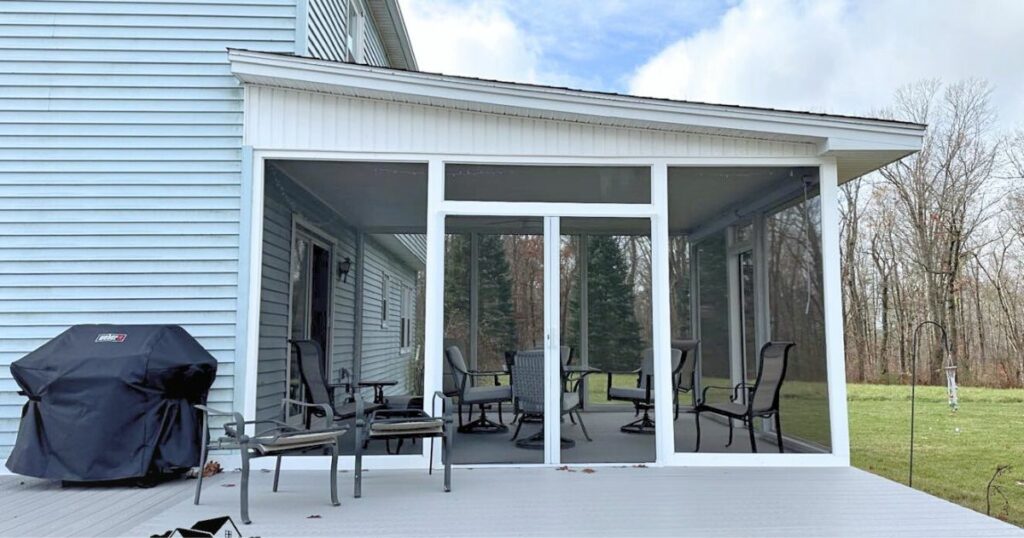
What Happens if You Build Without a Permit?
Building a deck without the necessary permits can lead to a multitude of problems. Here are three major consequences:
- Fines: If your local building department discovers the unpermitted construction, you could be hit with hefty fines. These fines can sometimes escalate the longer the issue goes unresolved.
- Legal Consequences: Selling your home can become more complicated. Potential buyers may be deterred by the legal implications of unpermitted work, and banks might refuse to finance a purchase.
- Structural Safety Risks: Decks built without permits might not adhere to safety standards. This can lead to dangerous construction flaws that could result in injuries, or worse.
How to Apply for a Deck Building Permit
Applying for a building permit might seem daunting, but it’s a crucial step in ensuring your deck is safe and legal. Here’s a straightforward process to follow:
- Gather Required Documents: You’ll typically need detailed plans of the proposed deck, including dimensions and materials. A site plan of your property showing the deck’s location relative to your home is also often necessary. Additionally, include an elevation drawing that provides a front or side view of the deck to evaluate the vertical aspects of the project.
- Application Process: Visit your local building department’s website or office to obtain the necessary application forms. Some municipalities allow you to submit these forms online.
- Inspection Readiness: After submitting your application, an inspector may need to review the site and plans to ensure they meet local codes and standards. Be prepared for this step by ensuring easy access to the proposed deck area and having all your documents handy.
Permit Costs
The cost of a permit varies widely depending on your location and the size and complexity of your deck project. Generally, you can expect to pay a fee based on the value of the construction or a flat rate determined by square footage.
Permit Denial Reasons
Permits can be denied for several reasons, such as plans that fail to meet zoning regulations, encroach on property lines, or do not comply with safety standards. Always double-check local regulations before submitting your plans.
DIY Considerations
For those considering a DIY deck, it’s crucial to understand not just the construction aspects but also the legal requirements. Even if you are capable of building the deck yourself, obtaining a permit and having the work inspected is non-negotiable. This ensures your deck is safe and increases the value of your home, rather than becoming a liability.
By taking these steps and understanding the importance of compliance, you can ensure that your deck is safe, legal, and a valuable addition to your home. Cutting corners by skipping the permit process can lead to significant problems down the line, potentially costing much more than the initial permit fees.
Our Content
Our experienced contractors and design specialists carefully review and edit all content to ensure it meets our high standards for quality and accuracy. We do this to provide our readers with content that is accurate, complete, reliable, and up-to-date. Bonsai Builders, located in Sutton, Massachusetts is a trusted neighborhood building source across Massachusetts for kitchen remodeling, construction process of brand new houses, and more with over 26 years of experience and over 125 jobs completed.
Bonsai Builders has renovated many split-level home kitchens across Massachusetts. Bonsai Builders is selected as best of Houzz year after year further showing their expertise and trust among homeowners in Massachusetts.
